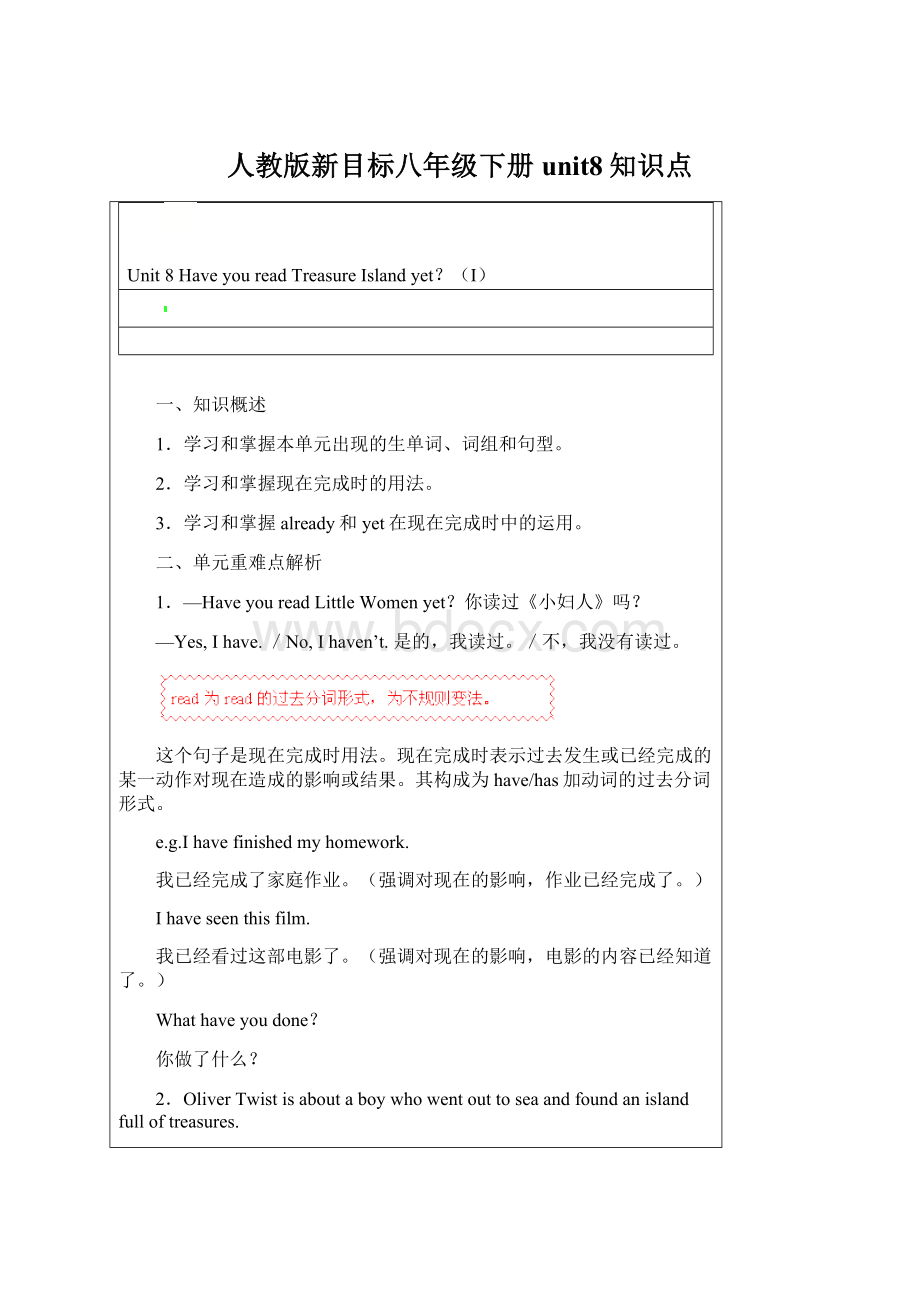人教版新目标八年级下册unit8知识点Word格式.docx
《人教版新目标八年级下册unit8知识点Word格式.docx》由会员分享,可在线阅读,更多相关《人教版新目标八年级下册unit8知识点Word格式.docx(17页珍藏版)》请在冰豆网上搜索。

full与fill
(1)full为形容词,表示“满的”,与of组成befullof短语后跟名词,侧重于状态。
(2)fill不及物动词,“装满”,常与with连用。
befilledwith意为“用……装潢/充满”;
fill…with…意为“将/使……装满/充满……”侧重于动作和装的东西。
e.g.Theclassroom
wasfullof
students.
教室里挤满了学生。
Thebasket
isfilledwith
applesbytheoldman.
篮子被这个老人装满了苹果。
He
filled
theglasswithwater.
他将玻璃杯盛满水。
3.Steve,haveyoudecidedyetwhichbooktowriteaboutforEnglishclass?
史蒂夫,你已经决定英语课写哪本书了吗?
这个句子是现在完成时的一般疑问句形式,把have直接提前了。
whichbooktowriteabout意为“写哪一本书”,此处为“疑问词+动词不定式”结构,在句中作宾语。
e.g.Ican’tdecide
whentostart.
我不能决定何时动身。
I'
mthinkingabout
howtodealwiththeproblem.
我正在考虑怎样处理这个问题。
拓展:
常用于此结构的疑问词还包括疑问代词who,whom,what及疑问副词when,where和how。
e.g.Hetaughtme
howtopronounceit.
他教我如何发音。
Ididn’tdecide
wheretolive.
我没有决定住哪儿。
4.I’vealreadyfinishedreadingit!
我已经看完了。
already表示“已经”,通常用在现在完成时的肯定句中。
yet,just,already都可以用在完成时的句子当中,但是需要注意的是just和already常用于肯定句中,yet常用于否定句和疑问句中,且常用于句末。
注意just置于动词与助动词之间,意为“刚才,刚刚”。
e.g.Haveyoucheckedyourpassports
yet?
你们已经检查了你们的护照了吗?
We’ve
already
checkedourpassports.
我们已经检查了我们的护照。
Wehaven’tgotourboardingcards
yet.
我们还没有拿到我们的登机牌。
Ihave
just
finishedmyhomework.
我刚刚做完家庭作业。
5.It’saboutfoursistersgrowingup.
它是关于四姐妹成长的故事。
growup为固定短语,意为“长大;
成长”。
此处用现在分词短语growingup作后置定语,修饰前面的名词sisters。
e.g.Wheredidyou
growup?
你是在哪儿长大的?
Thegirl
singingintheclassroom
ismyyoungersister.
正在教室里唱歌的女孩是我的妹妹。
6.Itwasreallygood,soIcouldn’tputitdown.
它真的很好,所以我爱不释手。
put…down意为“记下;
放下”,为“动词+副词”型短语,宾语若为代词,应放在put与down中间。
e.g.Putdown
thenewwordsandthenreadthemloud.
把生词记下来,然后大声读出来。
Putdown
yourbagandtakearest.
把包放下,休息一会儿吧。
put短语集锦:
putup搭起;
张贴;
举起
putout伸出;
扑灭
putoff推迟
putinto放进;
翻译
putaway放好;
存钱
puton穿上
putback放回;
把(钟)拨慢;
推迟;
阻碍
putone’sheartinto用心去做
7.Youshouldhurryup.Thebookreportisdueintwoweeks.
你应该快点。
读书报告两周后必须交。
(1)hurryup为固定短语,意为“赶快;
快点”。
e.g.Hurryup,oryouwillbelate.
快点,否则你会迟到的。
常见的hurry短语集锦:
①hurryoff/away匆匆离去
e.g.MissZhao
hurriedoff
tolookaftertheman.
赵老师匆匆赶去照看那个人。
②hurryinto匆忙进入
e.g.Herparentsaretryingto
hurry
her
into
marriage.
她父母设法催她快点结婚。
③hurryout匆忙出去
e.g.Theman
hurriedoutofthecar
beforereporterscouldspeaktohim.
记者们还未来得及与他交谈,这人就匆匆离开了汽车。
④inahurry匆忙地
e.g.Don’tbe
inahurry.
不要着急。
(2)due此处作形容词,意为“预期;
预定”,其后可接todo不定式。
e.g.Whenisthetrain
due?
火车预定什么时候到?
Herbabyis
due
nextmonth.
她的宝宝预计在下个月出生。
Theguests
aredueto
arriveverysoon.
客人们很快就会到。
①due作形容词时,还可意为“到期的;
应付(给)的”,通常与介词to连用,duetosb.意为“应付给或应给予某人”。
e.g.Thebillis
due.
这张票据已到期。
Agreatdealofmoneyis
duetoyou.
要付给你一大笔钱。
②dueto为固定短语,意为“由于;
因为”,后跟代词或名词。
e.g.Hedidn’tcometoschool
dueto
hisillness.
他因生病没有来学校。
Hersuccess
wasdueto
herhardwork.
她的成功是因为她努力工作。
8.AlthoughIhavelosteverything.Ihavenotlostmylife.
虽然我失去了一切,但我没有失去我的生命。
lost此处作及物动词,为lose的过去分词,意为“失去”。
e.g.Wedon’twantto
lose
thisfootballmatch.
我们不想输掉这场足球赛。
lost
hisleftarminlastyear’saccident.
他在去年那场事故中失去了左臂。
lost与missing
(1)lost指“(永远)遗失的”;
“失而找不到的”;
“迷路的”。
e.g.The
ringwasneverfound.
遗失的戒指再也没找到。
Hetook
thelostchild
tothepoliceman.
他把迷路的小孩带到警察那里。
(2)missing指“(暂时性)不见了的”;
“应有而缺少的”。
e.g.Thebookhad
twopagesmissing/twomissingpages.
那本书缺两页。
9.Ihavealreadycutdowntreesandbuiltahouse.
我已经砍倒了树木,建造了房子。
cutdown为固定短语,意为“把……砍倒;
裁短;
减少;
缩减”,cut此处作及物动词,其过去式和过去分词是cut本身。
e.g.They
cutdown
thebigtree.
他们把这棵大树砍倒了。
You’dbetter
cut
thearticle
down
toabout2,000words.
你最好把这篇文章缩减到两千字左右。
cut常见短语集锦:
(1)cutsb.sth.=cutsth.forsb.为某人切某物
e.g.He
me
asliceofbread.
=He
asliceofbread
for
me.
他为我切了一片面包。
(2)cutsth.intosth.把某物切成某物
e.g.First
themeat
smallpieces.
首先把肉切成小块。
(3)cutin插入;
插话;
插队;
超车
e.g.Don’t
cutin
whenothersaretalking.
别人说话时别插话。
attheheadoftheline.
他在队伍的前面插队。
(4)cutoff切断;
隔断;
断绝
e.g.Theflood
thevillagers
off
fromtherestoftheworld.
洪水切断了村民们与外界的联系。
10.I’mevenlearningtogrowfruitsandvegetables.
我甚至学会了种植水果和蔬菜。
(1)learn此处作及物动词,意为“学习”,后跟todo不定式作宾语。
learntodosth.意为“学习做某事”。
e.g.He’s
learning
todriveacar.
他正在学习开车。
与learn相关的短语:
learnfrom 向……学习
learnbyoneself 自学
learnof/about 得知;
获悉
(2)grow此处作及物动词,意为“种植”。
e.g.We
grow
f1owersandvegetablesinourgarden.
我们在花园里种植鲜花和蔬菜。
LastmonthI
grew
someflowers,andthey
fast.Severaldayslaterthey
up,andthey
grewbeautiful.
上个月我种植了一些花,它们生长很快。
几天后它们长大了,它们变得很美丽。
11.Whoelseisonmyisland?
我的岛上还有其他什么人?
else此处作形容词,意为“别的,其他的”,放在who,what等疑问词之后。
e.g.Whoelse
wasattheparty?
晚会上还有谁?
But
whatelse
canwedo?
但是我们还能做什么?
else用于以-one,-body,-thing,-place,-where结尾的复合不定代词/副词之后。
e.g.Ask
somebodyelse
tohelpyou.
请别人帮帮你吧。
Hehas
nothingelse
todotoday.
他今天没有别的事要做。
12.Oneofthemdiedbuttheotherrantowardsmyhouse.
其中一个人死了,但另外一个人跑向了我的房子。
(1)one…theother...为固定搭配,用于两者之间,意为“一个……另一个……”。
e.g.Thesupermarketison
theothersideofthestreet.
超市在街道的另一边。
Hehastwosons.
One
isadoctor,and
the
other
isastudent.
他有两个儿子。
一个是医生,另一个是学生。
some...theothers用于三者或三者以上,意为“一些……其余的……”。
e.g.Boysareontheplayground.
Some
areplayingbasketball,and
theothers
areplayingfootball.
男孩们都在操场上。
一些正在打篮球,其余的正在踢足球。
(2)towards介词,意为“朝,向;
对着”。
e.g.Theydrove
towards
thebeach.
他们驾车朝海滩开去。
TheoverseasteachersaidherChinesefriendswerefriendly
her.
那位外籍教师说她的中国朋友对她很友善。
13.InamedhimFridaybecausethatwasthedayImethim.
我称呼他为星期五,因为我在那天遇到的他。
name此处作及物动词,意为“给……取名;
给……命名”,namesb.sth.意为“给某人取名为……”。
named
theirchildJohn.
他们给孩子取名叫约翰。
(1)named/called为过去分词,作后置定语,意为“被命名为/称为……”。
e.g.Theboy
named/called
Mikeismyfriend.
那个叫迈克的男孩是我的朋友。
(2)namesb.sth.aftersb.意为“以……命名”。
e.g.Thechild
wasnamedafter
hisfather.
那个孩子是按他父亲的名字取的名。
14.Everytimesheisinthelibrary,Sallylooksatthemanybooksshe
hasn’tread
yetandshecan’twaittoreadthem!
每次在图书馆,莎莉看着许多她还未曾读过的书,就迫不及待地想阅读它们!
(1)lookat为固定短语,意为“看”,look为不及物动词,必须用at连接看的对象。
e.g.Lookat
theblackboard,please.
请看黑板。
Fatheralways
looksat
mewithloveinhiseyes.
父亲总是用慈祥的眼光看着我。
(2)can’twaittodosth.意为“迫不及待去做某事”。
can’twaitto
watchTV.
我迫不及待去看电视。
Theyoungman
couldnotwaitto
seehisgirlfriend.
这个年轻人迫不及待去看他的女朋友。
①can’thelpdoingsth.意为“情不自禁地做某事”。
couldnothelplaughing.
他情不自禁地笑了起来。
②can’tstanddoingsth.意为“不能容忍做某事”。
can’t
stand
waiting
foralongtime.
我不能容忍等这么久。
(II)
1.TheTomsmustbepopular.
汤姆乐队一定是家喻户晓的。
mustbe表示肯定推测,意为“一定是;
必定是”。
e.g.There
mustbe
amistake.
一定是弄错了。
Thelightison.Mary
in.
灯亮着。
玛丽一定在里面。
2.WhenSarahwasateenager,sheusedtofightoveralmosteverythingwithherfamily.
当莎拉是一个青少年的时候,她常常因几乎所有的事与她的家人争吵。
fightover为固定短语,相当于fightabout,意为“因为某事而争论,争夺”,fight的过去式和过去分词都为fought。
fightabout
smallthings.
不要为琐事争吵。
Thetwodogswere
fightingover
abone.
两只狗为一块骨头在撕咬。
3.Butfiveyearsago,whileshewasstudyingabroadinEngland,sheheardasongfulloffeelingsaboutreturninghomeontheradio.
但五年前,当她在英国出国留学时,她在广播中听到一首充满感情的回家歌曲。
(1)abroad副词,意为“在国外;
到国外”。
e.g.Weheardthathe
wentabroad
recently.
我们听说他最近出国了。
Hewas
abroad
from1970to1996.
他从1970年至1996年住在国外。
Hejustcameback
fromabroad.
他刚从国外回来。
abroad的固定搭配:
athomeandabroad在国内外
(2)ontheradio为固定短语,意为“通过收音机,以无线电的方式”。
e.g.Shesaidthatsheheardaveryinterestingprogramme
ontheradio.
她说她从收音机里听到一个非常有趣的节目。
与ontheradio类似的短语还有:
onTV 通过电视,在电视上
onthetelephone 打电话,在电话里
onthecomputer 通过电脑;
在电脑上
4.Shecametorealizehowmuchsheactuallymissedallofthem.
她逐渐意识到,事实上她是多么想念他们所有的人。
(1)cometodo此处意为“(事情)逐渐;
终于……”,表示达到某种状态,常与know,understand,realize,be,love,like等表示静态的动词连用,强调渐变过程。
e.g.Howdidyou
cometoknowhim?
你是怎么认识他的?
Whenyougetolder,you’ll
cometorealize
howmuchyourparentshavedoneforyou.
当你逐渐长大时,你会逐渐发现你的父母为你付出了多少。
cometodo还可意为“来做(从事)某事”。
e.g.Excuseme,wouldyouliketo
cometohelpme
withmyEnglish?
打扰了,你愿意来帮助我学英语吗?
Wehopeyou’ll
cometodobusiness
withus.
我们希望你们来与我们谈生意。
(2)howmuch此处用于表达一种程度,意为“多么”。
e.g.Youneverknow
howmuch
Imissmyparents.
你永远不知道我是多么想念我的父母。
(3)actually副词,意为“真实地;
事实上”。
e.g.Iknowshelooksyoung,butsheis
actually
50.
我知道她看起来很年轻,但实际上她50岁了。
(4)allof意为“所有人(或物)都……”。
e.g.Allofus
gotoschooleveryday.
我们所有人每天都去上学。
5.CountryisatraditionalkindofmusicfromthesouthernstatesofAmerica.
乡村音乐是来自美国南部的一种传统类型的音乐。
(1)akindof此处为固定结构,后跟名词,意为“一种……”。
e.g.Anappleis
akindoffruit.
苹果是一种水果。
kind短语荟萃:
①kindof+形容词“有点儿……”,相当于alittle/abit/alittlebit。
e.g.I’m
kindof
hungry.
我有点饿了。
②manykindsof+名词“很多种……”;
this/thatkindof+名词“这/那一种……”。
e.g.Thiskindof
filmisnotpopular.
这种电影不受欢迎。
③allkindsof+名词“各种各样的……”。
e.g.Wehave
allkindsof
timetofinishthejob.
我们有充足的时间完成这项工作。
④differentkindsof+名词“不同种类的……”。
e.g.Thereare
diffe